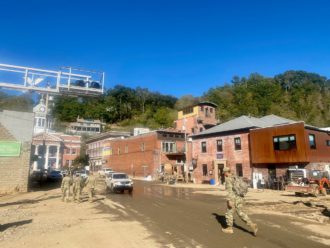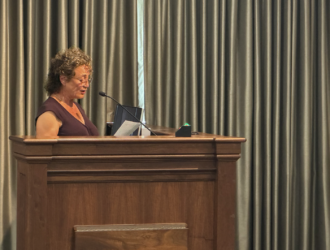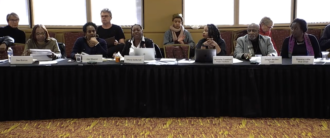“I’m hoping if some media attention can be brought to this, that maybe they will actually step up and get people’s trash and recycling bins to them or at least publicly address the situation.”


“I’m hoping if some media attention can be brought to this, that maybe they will actually step up and get people’s trash and recycling bins to them or at least publicly address the situation.”

“I think they should worry about getting the money for the schools back to normal and luring big companies to relocate here.”

“I am looking to get the county to be open to allowing studios and other creative spaces to apply for conditional use permits.”

After the storm, officials estimated that Helene created about 10 million cubic yards of debris in Buncombe County alone. County Manager Avril Pinder says “It’s going to take a long time” to clean up all the debris.

Local governments throughout Western North Carolina are facing a number of critical needs in the wake of Tropical Storm Helene, including temporary housing, infrastructure repair and debris removal.

“Friends, we must take personal action. The state will not even allow the city/county to ban single-use plastic bags, but we can stop using them.”

Tell us your about your experiences during Hurricane Helene. Perhaps your father-in-law spent all night scooping water out of the basement with a leaking Lowe’s bucket. Or maybe you and your neighbors banded together to clear trees on your street. Whatever the story may be, we want to hear it and consider it for publication.

For the first time since the storm hit overnight Thursday, Sept. 26, water has arrived for distribution to residents in need of potable and non-potable water.

“By failing to include a professional property manager on the task force, the county risks creating regulations that lack a full understanding of the practical realities of this market.”

The outdoor bar and event space, which has been located at the intersection of Hominy Creek and the French Broad River in West Asheville since 2016, is located on county-owned land and is being forced to move because of a stipulation in a land conservation easement agreement between the county and RiverLink.

Amid a housing crisis that has seen costs continue to skyrocket as supply can’t keep up with the rising demand, many families are just one bad break away from becoming homeless. But this fiscal year, Buncombe County is making its biggest investment yet in affordable housing. For the first time in years, county commissioners are sounding an optimistic note.

The grant application process can be time-consuming and frustrating for artists. Is it worth the effort?

Commission member MZ Yehudah cut right to the point at a recent meeting of the Community Reparations Commission. “Are reparations for Black Asheville legally defensible?” The answer, according to city and county attorneys, is complicated.

“Let’s contact our elected officials and let them know that you value our natural resources, wish they would think more about habitat and consider these plans.”

As a deadline nears for the Community Reparations Commission, pressure mounts for the group to finalize its recommendations for how the City of Asheville and Buncombe County governments can make amends to their Black residents.

“The onslaught started a few months ago, when my partner and I joined the City of Asheville’s composting program. The chore of taking our slop bucket to the East Asheville Library branch has been a revelation — of maggots.”

The county derives 62% of its more than $400 million budget from property taxes, which relies on the accurate assessment of thousands of properties, a process that happens every four years in Buncombe County. State law requires counties to perform reappraisals at least once every eight years.

“The government should be doing all it can to support the commission in crafting recommendations to repair harm from the centuries of damage done by our government and society to Black people.”

Buncombe County filed a motion to intervene in N.C. Attorney General Josh Stein’s lawsuit against HCA Healthcare and Mission Health. The county seeks more than $3 million in damages from HCA and Mission.

At a Community Reparations Commission meeting March 18, the Carter Development Group identified four themes and outlined 10 “high priority” recommendations for actions local governments should take to cease harm to their Black residents.

Community members who spoke with Xpress say they are relieved that the Swannanoa Library has been saved from the chopping block for now. But many questions still remain about its future as well as who will be involved in the decision-making process moving forward.